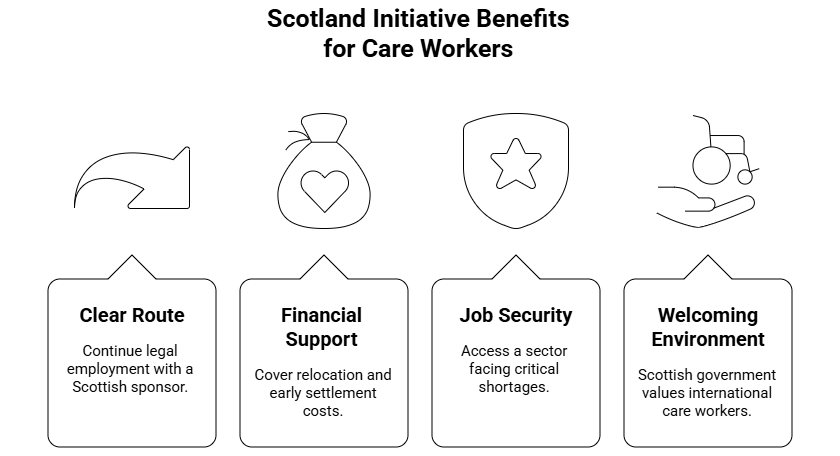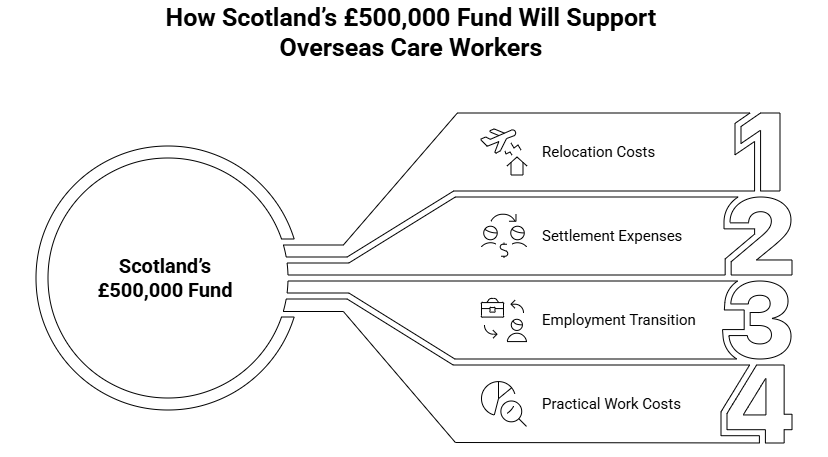Posted on November 20 2025
Scotland Opens New Pathway for Overseas Carers to Work in the UK. Check if you are eligible!
By , Editor
Updated November 20 2025
Highlights: Scotland Introduces Support Route for Displaced Overseas Carers
- The Scottish government has announced a new initiative to support international social care workers affected by recent UK visa policy changes.
- A dedicated £500,000 fund will help eligible displaced workers relocate and start care roles in Scotland.
- UK Health & Care Worker Visa grants for care roles have fallen by 88% since March 2024 due to new immigration restrictions.
- Some care providers in Scotland rely on up to 90% overseas staff, highlighting the urgent need for international workers.
- The first group of relocating care workers is expected to start new roles in Scotland before Christmas.
*Want to work in Scotland? Sign up with Y-Axis for complete support with the process.
Scotland Creates Opportunities for Overseas Care Workers Impacted by UK Visa Rules
The UK government’s immigration changes, introduced in March 2024, dramatically tightened the rules around sponsoring foreign social care workers. Employers across England, Wales, and Northern Ireland faced new restrictions, reducing their ability to hire overseas talent. Health and Care Worker Visa approvals for care roles dropped by 88%, leaving thousands of international workers suddenly without sponsored employment.
Many of these affected professionals were from countries like India, the Philippines, and Nigeria, who had moved to the UK on legitimate work visas and were contributing significantly to the country’s care services.
To address this, the Scottish government introduced a £500,000 relocation and support fund, targeting:
- International care workers already living in the UK
- Workers who lost their sponsorship due to immigration policy changes
- Qualified carers willing to move to Scotland’s understaffed social care sector
This initiative aims to offer displaced workers financial help to relocate, settle, and transition into stable employment in Scotland, while simultaneously strengthening Scotland’s critically understaffed care workforce.
*Looking to apply for jobs abroad? Avail Y-Axis Job Search Services to find the right one.
Scotland Invites Global Care Workers to Rebuild Their Careers
Scotland’s new relocation support scheme is more than a short-term response, which offers a hopeful pathway forward.
The £500,000 support fund is designed to help displaced international workers restart their careers by joining Scotland’s social care workforce. With many Scottish care services operating under intense pressure, some depending on up to 90% overseas staff—the country has a strong and ongoing need for experienced foreign care workers. This demand creates a practical opportunity for eligible professionals who can relocate and fill high-priority roles.
For workers who lost sponsorship due to the UK’s March 2024 restrictions, this initiative offers:
- A clear route to continue legal employment, provided they secure a Scottish sponsor.
- Financial support to cover relocation and early settlement costs, reducing the burden of moving.
- Access to a sector facing critical shortages, improving job security and long-term prospects.
- A more welcoming environment, as the Scottish government openly values international care workers.

Scottish officials have strongly criticised the UK government’s decision to scrap the Social Care Visa Route from July 2025, calling it damaging and unsustainable. In contrast, Scotland is positioning itself as a supportive destination for global care talent, emphasising the essential contribution of international workers to its health and social care systems.
For Indian professionals already in the UK, this initiative provides a timely chance to secure new roles before visa deadlines approach. The government expects the first group of relocating workers to join employers before Christmas, helping stabilise the sector while giving displaced workers a fresh start in Scotland.
*Want to work abroad? Get in touch with experts at Y-Axis to guide you through the process.
How Scotland’s £500,000 Fund Will Support Overseas Care Workers
As part of its new initiative, the Scottish government has confirmed that the £500,000 support fund will directly assist displaced international social care workers with key relocation and resettlement expenses. For many overseas workers who suddenly lost sponsorship due to UK visa restrictions, this financial aid could be the difference between uncertainty and a stable future.
The fund will help eligible workers cover essential costs such as:
- Relocating to Scotland from other parts of the UK
- Initial settlement expenses needed to move into a new community
- Transitioning into secure employment, including early on boarding needs
- Practical costs linked to starting work in Scotland’s social care sector

This targeted support is designed to ease the pressure on affected workers who may otherwise struggle with unplanned moving costs, visa-related challenges, or the fear of losing their lawful stay in the UK. By helping them relocate swiftly and smoothly, Scotland aims to protect both its care workforce and the individuals who rely heavily on the stability that international care workers bring.
*Are you looking for step-by-step assistance with overseas immigration? Contact Y-Axis, the world’s No. 1 overseas immigration consultancy!
For recent immigration updates, check out Y-Axis News Page!
FAQs
1. What new route has been introduced for international social care workers in Scotland?
Scotland has introduced a dedicated support route to help international social care workers who have been affected by recent UK visa changes. This new pathway is designed to assist workers who were offered jobs but could not take them up due to the removal of dependants’ rights under the Health and Care Worker Visa. The initiative aims to help employers fill urgent vacancies and ensure continuity of care across Scotland. It provides targeted support to enable overseas workers to take up roles, settle into their jobs, and contribute to Scotland’s growing social care workforce.
2. Who is eligible for the £500,000 support fund announced by the Scottish Government?
The £500,000 support fund is intended for overseas social care workers who were offered employment in Scotland but were unable to relocate due to recent changes in UK visa rules. These workers may have been displaced by the restrictions on bringing dependants, which prevented many from accepting job offers. The fund is also designed to help care providers who invested time and resources in international recruitment. It aims to cover costs associated with onboarding, training, and relocation support, ensuring that both workers and employers can move forward despite the disruptions caused by policy changes.
3. Why has Scotland offered this support to overseas social care workers displaced by UK visa changes?
Scotland introduced this support to address workforce shortages and ensure stability in the social care sector. Many international workers who had job offers were unable to move due to the UK Government’s decision to restrict dependants under the Health and Care Worker Visa. This left both employers and workers in difficult positions. The Scottish Government’s initiative is intended to fill critical staffing gaps, support displaced workers, and safeguard essential care services. By offering financial and practical assistance, Scotland aims to maintain recruitment momentum and ensure that vulnerable individuals continue receiving the care they need.
4. What are the key concerns raised by the social care sector about the new initiative?
The social care sector has welcomed the initiative but expressed several concerns. Providers want clarity on how the fund will be distributed and which workers or employers will qualify. Many are unsure whether the support will cover full relocation costs or only partial assistance. There are also questions about the long-term sustainability of workforce planning if visa rules continue to shift. Organisations highlight that while financial support is helpful, broader reforms are needed to address structural challenges, including recruitment, retention, fair pay, and workload pressures across the sector. More detailed guidance is awaited.
5. How has the number of Health and Care Worker Visas granted for care roles changed since March 2024?
Since the UK Government introduced restrictions on dependants for care roles, the number of Health and Care Worker Visas granted for social care positions has dropped significantly. The decline has raised concerns among employers who rely heavily on international recruitment to fill essential roles. Many providers report struggling to replace staff or bring in new workers due to reduced interest from overseas applicants. This reduction has placed additional pressure on Scotland’s already stretched social care workforce and prompted the development of targeted support measures to stabilise recruitment and ensure continuity of care.
6. When are the first international social care workers expected to start jobs in Scotland under this route?
The first group of international social care workers supported through this route is expected to begin their roles in Scotland later this year. Many have already completed initial recruitment steps but were unable to proceed due to visa restrictions. With the introduction of the support fund and clearer guidance, employers anticipate that onboarding and relocation processes will resume shortly. This timeline may vary depending on individual visa applications, documentation, and employer readiness, but early indications suggest that new workers will begin arriving within the coming months, helping to ease staffing pressures across the sector.
7. What questions remain about how the support fund will operate and whom it will benefit?
Several questions remain regarding how the support fund will be administered. Employers and workers are seeking clarity on eligibility criteria, including whether the fund will prioritise workers who were already partway through recruitment or those who were fully displaced. There is also uncertainty about the types of costs that will be reimbursed, such as travel, training, accommodation, or administrative fees. Providers are awaiting detailed guidance on application processes, timelines, and how quickly the funding will become available. The sector is also curious about whether future support measures may be introduced if visa challenges continue.
8. How significant are overseas staff in Scotland’s social care workforce, according to provider bodies?
Overseas staff play a vital role in Scotland’s social care workforce, filling gaps that cannot be met through local recruitment alone. Provider bodies report that international workers help maintain essential services, particularly in areas experiencing severe shortages. Many employers rely on foreign staff for both long-term and specialist roles, ensuring continuity of care for older adults, individuals with disabilities, and vulnerable communities. Without international recruitment, the sector would face substantial challenges in meeting demand. This reliance underscores the importance of supportive policies and stable visa pathways to retain global talent within Scotland’s care system.
9. What broader labour and reform challenges does Scotland’s social care sector continue to face?
Scotland’s social care sector faces ongoing challenges related to staffing shortages, recruitment difficulties, and retention issues. Low pay, high workloads, and limited career progression options contribute to workforce instability. Providers also highlight the need for long-term reform around funding, training, and professional development to strengthen the sector. Visa changes and uncertain immigration policies have added extra pressure, making international recruitment more complex. Despite these issues, the sector remains committed to improving care quality, supporting its workforce, and expanding pathways to attract skilled workers from both within Scotland and overseas.
10. How is Scotland responding to UK government visa policy changes affecting the social care workforce?
Scotland is responding proactively by creating targeted support measures to assist both employers and international workers affected by recent visa restrictions. The new support fund aims to reduce financial strain and help workers who were unable to relocate despite having job offers. Additionally, Scottish leaders continue to advocate for migration policies that reflect the needs of the care sector and allow for sustainable workforce planning. These efforts demonstrate Scotland’s commitment to maintaining adequate staffing levels, protecting vulnerable communities, and ensuring that international recruitment remains a viable option for strengthening the social care workforce.
Tags:
Work abroad
overseas immigration news
Work in Scotland
migrate to Scotland
Scotland immigration
Jobs in Scotland
Jobs in Scotland for caregivers
work in Scotland
health and care workers in Scotland
funds for international social care workers
Share
Options for you by Y-Axis
Get it on your mobile
Get News alerts
Contact Y-Axis

